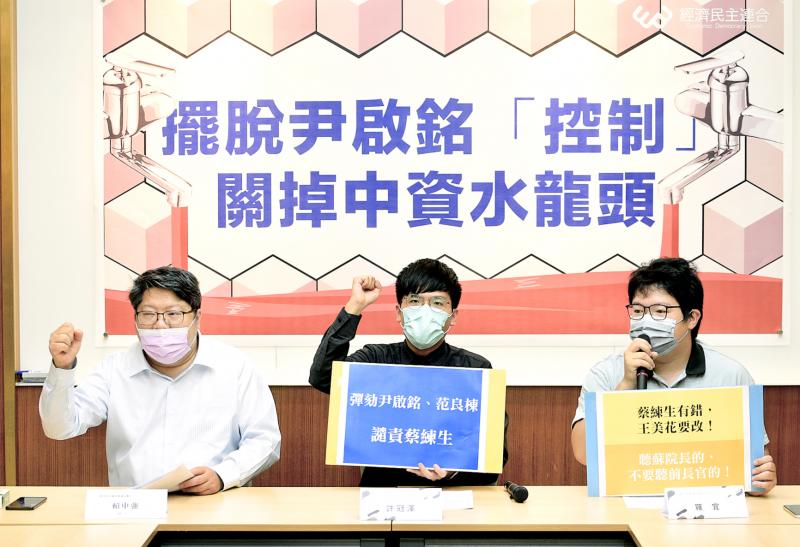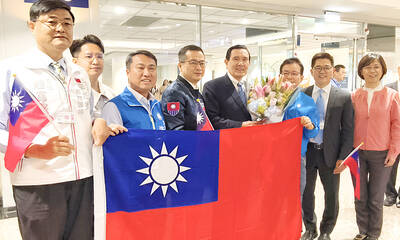Economic officials should ignore the faulty definition of Chinese investment that has led to a “leaky faucet” allowing unmitigated capital into Taiwan, the Economic Democracy Union said yesterday, calling for a Control Yuan investigation into top officials who created the definition.
The problem started in 2009, when the Ministry of Economic Affairs passed the Measures Governing Investment Permits to the People of the Mainland Area (大陸地區人民來台投資許可辦法), union researcher Hsu Kuan-tze (許冠澤) told a news conference at the Legislative Yuan in Taipei.
He said that the measures stipulate investment qualifications that leave loopholes for Chinese investors.

Photo: Peter Lo, Taipei Times
In particular, Article 3 defines a controlling share to be at least 30 percent of an entity, whereas its parent law, the Act Governing Relations Between the People of the Taiwan Area and the Mainland Area (臺灣地區與大陸地區人民關係條例), does not mention either a controlling stake or percentage, Hsu said.
This is the reason Chinese investors can now “play the numbers game” to channel funds into Taiwan, and differs from the parent law’s criterion of having “significant influence” to determine whether an investment should be regulated, Hsu said.
Introducing the “controlling stake” criterion provides Chinese investors with a protective cocoon, he added.
However, if the “significant influence” definition is applied, it could uncover many Chinese investors hiding behind foreign capital, Hsu said, citing for example Tencent Holdings Ltd’s stake in ShopeePay’s parent company, Singapore-based SeaMoney (Payment) TW Private Ltd.
This loophole is the “masterpiece” of then-minister of economic affairs Yiin Chii-ming (尹啟銘), then-Investment Commission executive secretary Fan Liang-tung (范良棟) and Chinese National Federation of Industries secretary-general Tsai Lien-sheng (蔡練生), Hsu said.
The goal was to allow Chinese funds to flow through a “green channel” as much as possible, similar to other foreign investment, while minimizing the scope of the “red channel,” he said.
Because of this definition, illegal Chinese investors are now using multilevel holdings to dilute their investments and circumvent the 30 percent rule, he said.
Yiin, who served as economic minister from 2008 to 2009, is also secretary-general of the Cross-strait CEO Summit, an important part of China’s economic “united front” efforts, union convener Lai Chung-chiang (賴中強) said, adding that Fan and Tsai serve as deputy secretaries-general of the summit.
As such, Minister of Economic Affairs Wang Mei-hua (王美花) is responsible for checking whether the decisions made under their tenure are harmful to the nation, Lai said.
She should heed Premier Su Tseng-chang’s (蘇貞昌) call to “seal the leaky faucet rather than always mopping the floor,” as enforcing the 30 percent rule only distorts the source of Chinese capital, Lai said.

Former president Ma Ying-jeou’s (馬英九) mention of Taiwan’s official name during a meeting with Chinese President Xi Jinping (習近平) on Wednesday was likely a deliberate political play, academics said. “As I see it, it was intentional,” National Chengchi University Graduate Institute of East Asian Studies professor Wang Hsin-hsien (王信賢) said of Ma’s initial use of the “Republic of China” (ROC) to refer to the wider concept of “the Chinese nation.” Ma quickly corrected himself, and his office later described his use of the two similar-sounding yet politically distinct terms as “purely a gaffe.” Given Ma was reading from a script, the supposed slipup

Former Czech Republic-based Taiwanese researcher Cheng Yu-chin (鄭宇欽) has been sentenced to seven years in prison on espionage-related charges, China’s Ministry of State Security announced yesterday. China said Cheng was a spy for Taiwan who “masqueraded as a professor” and that he was previously an assistant to former Cabinet secretary-general Cho Jung-tai (卓榮泰). President-elect William Lai (賴清德) on Wednesday last week announced Cho would be his premier when Lai is inaugurated next month. Today is China’s “National Security Education Day.” The Chinese ministry yesterday released a video online showing arrests over the past 10 years of people alleged to be

The bodies of two individuals were recovered and three additional bodies were discovered on the Shakadang Trail (砂卡礑) in Taroko National Park, eight days after the devastating earthquake in Hualien County, search-and-rescue personnel said. The rescuers reported that they retrieved the bodies of a man and a girl, suspected to be the father and daughter from the Yu (游) family, 500m from the entrance of the trail on Wednesday. The rescue team added that despite the discovery of the two bodies on Friday last week, they had been unable to retrieve them until Wednesday due to the heavy equipment needed to lift

THE HAWAII FACTOR: While a 1965 opinion said an attack on Hawaii would not trigger Article 5, the text of the treaty suggests the state is covered, the report says NATO could be drawn into a conflict in the Taiwan Strait if Chinese forces attacked the US mainland or Hawaii, a NATO Defense College report published on Monday says. The report, written by James Lee, an assistant research fellow at Academia Sinica’s Institute of European and American Studies, states that under certain conditions a Taiwan contingency could trigger Article 5 of NATO, under which an attack against any member of the alliance is considered an attack against all members, necessitating a response. Article 6 of the North Atlantic Treaty specifies that an armed attack in the territory of any member in Europe,